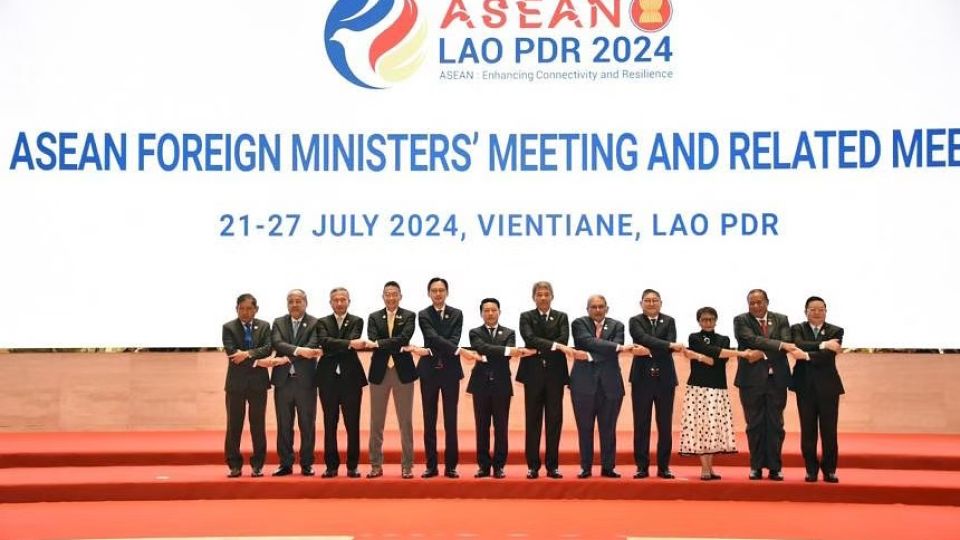July 26, 2024
JAKARTA – ASEAN is not a proxy for any major power, Indonesia’s top diplomat asserted on Thursday in a meeting with Southeast Asian counterparts in Laos, amid concerns the bloc is not pulling its weight enough amid a precarious power rivalry in its own backyard.
Tensions in the region are only one wrong move away from an open conflict, Foreign Minister Retno LP Marsudi suggested, lamenting the lack of commitment shown by some ASEAN partners in keeping the region free of nuclear weapons.
Navigating tensions sparked by the rivalry between the United States and China and the unabating territorial dispute over the region’s strategic waters have become among the most prominent discussion points at the 57th ASEAN Foreign Ministers’ Meeting (AMM) in the Laotian capital of Vientiane.
The early days of the talks on Wednesday and Thursday, traditionally held for the bloc’s internal housekeeping discussions ahead of meetings with its major partners, came amid surging geopolitical uncertainties from increased security alliances within the region, which have evidently tested several ASEAN member states in recent times.
The Philippines, for example, which has a disputing claim against Beijing in the South China Sea, has chosen to align its military with the US. The archipelagic nation also entered a security partnership with Japan earlier this month.
“One wrong step in the South China Sea will turn a small spark into a terrifying firestorm,” Retno said on Thursday following a retreat session where envoys engaged in candid discussions.
Against such a backdrop, she also warned that ASEAN member states must be united in their autonomy, stressing that the bloc must remain the primary institution of the region amid pulls from all directions.
“Once ASEAN becomes a proxy, it will find it challenging to play a central role: to remain the anchor of peace and stability in the region,” the Foreign Ministry wrote in a statement on Thursday.
The ministry added that Indonesia would ensure the mainstreaming of the ASEAN Outlook on the Indo-Pacific (AOIP) implementation, both within the bloc’s activities and during dialogues with partners.
The AOIP, or ASEAN’s take on navigating the Indo-Pacific, emphasizes dialogue and diplomacy for mitigating tensions as opposed to force. But it has had little luck in gaining practical traction from global powers.
The Indo-Pacific region has become a global center of attention in recent years. Countries increasingly attempt to establish their presence through various strategies, following China’s rapid rise in the region and abroad that has shifted much of the contemporary geopolitical landscape.
The North Atlantic Treaty Organization (NATO), for example, established during their summit in early July its interest in increasing engagement in the Indo-Pacific, raising concerns it could be the latest addition to foreign security forces patrolling the tensed-up region.
ASEAN centrality and unity must be further enhanced to “promote ASEAN’s relevance and resilience in addressing emerging challenges”, as urged by Laotian Foreign Minister Saleumxay Kommasith in his opening statement as the meeting chairman.
The Southeast Asia Nuclear Weapon-Free Zone (SEANWFZ) Treaty, for example, which seeks to keep the region free from weapons of mass destruction from nuclear states, has yet to make any significant progress from major global powers.
“The threat of nuclear weapons is increasing and becoming evident,” Retno said in a press briefing on Wednesday following a SEANWFZ Commission meeting, citing the withdrawal of several nuclear weapon states from global nuclear non-proliferation efforts.
“Such a decrease in commitment from these countries will, in a real way, impact the region’s stability in a negative way.”
Talks with ASEAN’s major partners, including the US and China, are scheduled to run from Friday to Saturday. Several confirmed attendees include US Secretary of State Anthony Blinken, Chinese foreign minister Wang Yi and Russia’s top diplomat Sergei Lavrov.
Blinken is slated to meet with Yi in Laos to supposedly convey reminders of adherence to international law, while also convincing ASEAN members of the US’ continued presence in the Indo-Pacific regardless of the results of its elections in November.
Observers have been raising concerns that if Donald Trump is reelected in November, the US will turn its head away from the Indo-Pacific.
The AMM is expected to produce several documents over the next several days, including a joint communique, a chairman’s statement and several joint statements with ASEAN partners, such as China and the United Kingdom.


